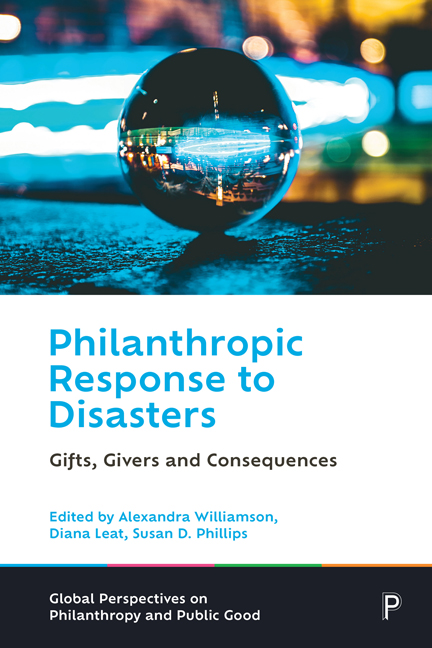Book contents
- Frontmatter
- Contents
- List of tables and figures
- Notes on contributors
- Series editors’ preface
- 1 Introduction
- 2 The public’s philanthropic response to disaster: plus ça change?
- 3 Disaster fundraising: readiness matters
- 4 Roles of philanthropic foundations as funders and distribution agents in disaster response
- 5 The private sector and disasters: from reactive response to disaster resilience
- 6 Fundraising, grantmaking and regulatory issues: regulating good in bad times
- 7 Doing good better: public policy for disaster philanthropy
- 8 Philanthropy’s place in community-based capacity development for disaster resilience
- 9 Nonprofit collaboration and coordination in disaster response: lessons from the 11 September recovery
- 10 The promise and reality of philanthropy in disasters
- 11 Conclusions and looking forward
- Index
3 - Disaster fundraising: readiness matters
Published online by Cambridge University Press: 17 January 2024
- Frontmatter
- Contents
- List of tables and figures
- Notes on contributors
- Series editors’ preface
- 1 Introduction
- 2 The public’s philanthropic response to disaster: plus ça change?
- 3 Disaster fundraising: readiness matters
- 4 Roles of philanthropic foundations as funders and distribution agents in disaster response
- 5 The private sector and disasters: from reactive response to disaster resilience
- 6 Fundraising, grantmaking and regulatory issues: regulating good in bad times
- 7 Doing good better: public policy for disaster philanthropy
- 8 Philanthropy’s place in community-based capacity development for disaster resilience
- 9 Nonprofit collaboration and coordination in disaster response: lessons from the 11 September recovery
- 10 The promise and reality of philanthropy in disasters
- 11 Conclusions and looking forward
- Index
Summary
Benevolence
Effective fundraising is essential to philanthropic responses to disaster. Many of the factors that encourage people to respond to appeals are already in place: needs are urgent and compelling; potential supporters know a lot about the issue from mass and social media and are moved by these reports. At first glance, fundraising for disasters may look simple, but it rarely is. Indeed, the metaphor of the perfect storm is aptly suited to fundraising in this context.
The chapter first explores the challenging conditions under which disaster appeals occur and how these distinguish disaster fundraising from ‘regular’ fundraising and resource development. The media is a critical factor in disaster fundraising as it shapes perceptions of need and responsibility, often with dramatic images that contribute to a sense of urgency – or alternatively a sense of complacency when there is limited coverage. The surprise of any particular disaster often means that fundraisers – whether charities and nonprofits or intermediaries – are not prepared for an immediate campaign. Drawing together insights about disaster fundraising from key sub-disciplines including disaster management and logistics, marketing, communication/ media studies, psychology, and fundraising/ philanthropy studies, the chapter provides a critical assessment of how fundraising organisations can be better prepared for philanthropic responses to disaster. Specifically, institutional readiness depends on: (1) a strong case or value proposition to inform potential supporters; (2) an identified constituency base of potential support; and (3) committed leadership with a feasible strategy. The conclusion offers brief implications for students, researchers, fundraising organisations and those who fund and monitor them.
Definitions and the conditions for a perfect storm
Need, urgency, scale, and potential for mistakes and misconduct: these factors differentiate fundraising from the normal rhythm of ‘resource development’ and sometimes converge to create a perfect storm of enabling conditions for missteps or outright failure. As a basis for shared understanding of fundraising in disaster contexts, some definitions are helpful.
Definitions: fundraising and development
Fundraising is commonly thought of as raising money for a particular cause or programme. Funds can be raised from a variety of sources – most typically individuals, but also businesses, governments and philanthropic foundations. Government or institutional philanthropic funding often flows in the form of grants through the fundraising practice of grantseeking. Fundraising organisations are key actors in disaster relief and direct appeals to a variety of communities (Okada et al, 2018).
- Type
- Chapter
- Information
- Philanthropic Response to DisastersGifts, Givers and Consequences, pp. 44 - 75Publisher: Bristol University PressPrint publication year: 2023



